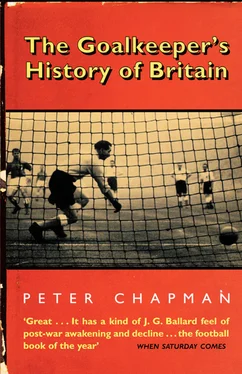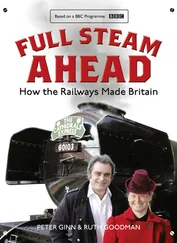After his Cup medal, Swift’s club career reached another peak when Manchester City won the league in 1937. Runners-up were Charlton Athletic, whose goalkeeper, Sam Bartram, had a similar personality and style. Not quite of Swift’s physical dimensions, he was a tall and broad, red-haired character, who indulged in the flamboyant when opportunity arose. Much thanks to him, Charlton had climbed in successive seasons from the Third Division South, through the Second, to challenge for the First Division title itself. Swift and Bartram were identified as future rivals for a place in the England team and at one stage Bartram appeared the most likely contender. The season after Charlton ran Manchester City closely for the championship, he played for the Possibles against the Probables in an England trial.
Swift and Bartram had been born within weeks of each other a little before the start of the First World War. From, respectively, the industrial north-west and north-east, they grew up in regions feeling the worst of the post-war recession. The country’s mood was also steeped in memories of one awful conflict and the strengthening conviction that a worse one was on the way. The Great War had had the wonders of the trenches and ‘going over the top’; everyone knew the next war would bid goodbye to all that with mass aerial bombardment of the cities. Swift and Bartram were products of the widely-held view among ordinary people that there was little sane reaction but to laugh, make the best of it and pretend the worst was not going to happen. If ever the laughter had to be prompted a little, there were always characters around like Swift and Bartram to help its orchestration. Vaudeville keepers in their way, they played in response to popular demand.
In any of their off-duty pictures I later saw – team photos, head-and-shoulders portraits, or shots of them being introduced to one dignitary or another before a big game – they were always at least smiling. In accounts of their matches that I read or was told about, their presence dominated. Each was likely to rush from the keeper’s 6-yard box, to the edge or beyond the penalty area to clear the ball, forsaking their hands and heading it if necessary. This was a way of doing things much more familiar to keepers on the continent. It brought the keeper out of his remote condition and into closer touch with his team. Both Swift and Bartram were students of the style of Harry Hibbs – now nearing the end of his career – and sought advice from him on how it was all meant to be done. But notes taken, they moved far beyond the role of humble ‘custodian’.
Two weeks after my dad’s nineteenth birthday the war was declared, an occasion as stressful at that age as playing in the Cup Final. After listening to Chamberlain’s announcement, he went out in the back garden where his dad grew the vegetables and, as the phrase has it, broke down. His father followed and tried to help: ‘That’s OK, son, there’s nothing to worry about,’ he might have offered. ‘I passed through the Menin Gate and the various battles of Ypres. Nasty explosion at the Somme, of course, and this open hip wound still plays up. But I survived – when most of the Beds and Herts were wiped out, they made me sergeant major for a day till reinforcements arrived.’ But, in that moment, my Bedfordshire grandfather opted to stay quiet.
For two years my father’s bricklaying had him on such essential works as building the Tempsford aerodrome. A Stuka came for a few minutes one afternoon and strafed the hundred or so of them working up the sheer face of the cooling towers at Barford. The bombing of London had prompted my mum’s move to the country and they got married after he was called up into the Royal Signals. In Greenock he and several thousand others were put on ships which sailed west almost as far as Iceland. They weren’t told where they were going, up to the point the boats turned to plunge south. Through the Bay of Biscay the weather was so rough the convoy’s members were rarely in sight of each other. Maybe the conditions were a problem for the German U-boats as well. The next convoy out a fortnight or so later lost a third of its number. My dad’s ‘never saw a seagull’. Straight, more or less, from Sandy, Bedfordshire, he arrived at the Saharan fringes of North Africa, landing with the army in Algiers in 1942.
Across Algeria and Tunisia, the task of pushing back Rommel and his Afrika Korps allowed little opportunity for football or any other game but was carried out in a spirit not seen elsewhere in the war. The British troops viewed Rommel as a ‘good bloke’, a German but a fair one. This marked him as a man apart from the madness of his Nazi teammates. It didn’t mean whatever wit and cunning the ‘Desert Fox’ had could match ours. Near the Tunisian coastal town of La Goulette, shortly before my dad sailed from Cap Bon for Italy, he watched thousands of captured Germans march into their prison camp. This they did in immaculate order, seemingly perfectly according to character. Then they fell into weird nights behind the wire, when their mood alternated between crazed merriment and near riot.
The British army’s attitude to the enemy appeared to be as much a worry to the top brass, even after the Germans had been defeated in Africa and the Sicily landings completed. Maybe the official view was that the soldiers’ achievements might go to their heads. My dad’s company was called together in the almond grove where they were camped near Syracuse and, in line with a War Office directive, bawled out for their apparent misconceptions about Rommel. Not that they took a great deal of notice; there had to be some lone symbol of decency even in the worst of worlds.
All in all, my father said, he was lucky. His brother Reg was sent to Burma. At Kohima the British were besieged for weeks, separated by the width of the High Commissioner’s tennis court from the Japanese screaming at them on the other side. My uncle had injured mates pleading with him to shoot them and put them out of their misery. He was lying wounded in a makeshift hospital himself when the Japanese stormed it at one door and caught up with him after he’d got out the other. Injured by a bayonet thrust, he feigned death in the long grass.
In comparison, the Royal Signals was a doddle. My father had to master Morse Code and spent much of the day tapping it out. He’d applied for the Royal Engineers, thinking it wanted people from the building industry. In relief, when that came to nothing, his dad explained he’d have been constructing Bailey bridges across rivers and repairing phone lines in no man’s land, under what the army liked to refer to as ‘hot fire’.
But events had a way of springing themselves upon you, pulling you suddenly in. You had to beware of the unguarded moment. The German attack on Bari harbour in December 1943 came when we had got ‘too cocky’ and confident of victory. Everyone saw the single German spotter plane circling very high and watched the anti-aircraft fire chase it away. They thought no more about it till at night the aerial assault came in. The harbour was floodlit; the twenty-boat convoy, recently arrived was being unloaded. Two ammunition carriers went up and took fourteen other ships with them. One explosion, like the crack of a large whip, threw my dad 15 feet across his room, door and windows with him; this was 6 miles away along the coast in Santo Spirito. A chance hit,’ wrote Churchill, ‘30,000 tons of cargo lost.’ He didn’t mention the thousand killed among the Italian dockyard workers, merchant seamen and Allied military personnel. In the yard next morning victims, dead and alive, had turned yellow. The medics had no idea for days what they were dealing with, till word went around that General Eisenhower had ordered a consignment of mustard gas. Not that we’d have used it without cause, mind you. We just had it in case the Germans used it first.
Читать дальше












